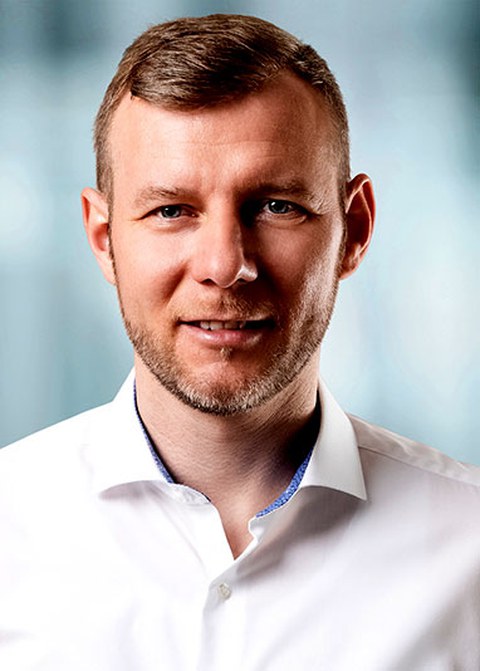Talking about money requires trust
(interview from 2022)
Dagmar Möbius
Entrepreneurship has fascinated Christian John ever since he was a student. He now offers financial support to budding entrepreneurs with innovative ideas. As an Investment Manager, the economist advises and supports start-ups in Saxony. Christian John, who is originally from Thuringia, has a low opinion of the German tendency to avoid taking risks and looks forward to every Monday morning.

Christian John still has close ties with TUD’s Faculty of Business and Economics and is actively involved in seminars.
At school, Christian John’s teacher inspired him to study history at university. “I was always good with numbers, but I’m not so gifted with languages, unfortunately,” says the 36-year-old. For this reason, he didn’t have the qualification in Latin he needed, and he abandoned the idea of studying history. After graduating from high school and completing his military service in 2005, Christian John completed an apprenticeship in banking in Hanover, which was supervised by the Frankfurt School of Finance & Management. Starting in 2008, he briefly worked in retail banking with Commerzbank in Thuringia when he realized, “I don’t want to do this until I retire.” The financial crisis in the US reaffirmed his decision to begin studying full time. From 2008 until 2012, Christian John studied Economics with a concentration on International Management at the Friedrich Schiller University Jena and completed a semester abroad in England at the University of Hull. “I was most interested in where all the aspects of what I studied have their start in a company.” So, in his Bachelor’s thesis, he focused on start-ups that operate on international markets immediately after their founding.
Christian John began studying at TU Dresden in 2012 for his Master’s in Business Administration. “I wanted to get to know another city, TUD has a good reputation, the application process was straightforward and Dresden is, of course, a beautiful city that offers a good quality of life and an abundant range of leisure activities.” He also found the Chair of Entrepreneurship & Innovation ideal. Looking back, Christian John never regretted his decision. He tells us, “The degree program was varied – it didn’t just focus on exams and mundane rote learning. In my concentration, we had block seminars, workshops, project groups and seminar papers as well as a mini practical on corporate financing, technology management and marketing. And I’m still benefiting from this today.” During the second semester of his Master’s studies, Christian John created GründerGarten. This non-profit association supports and advises students who are interested in creating their own start-ups and helps them to build up a network.
Right after graduating, Christian John started working as an Investment Project Manager. First, at the German Startups Group Berlin, then he worked in Business Development at Houzz, an American online platform for construction, interior design and renovation projects. In 2018, he returned to TU Dresden as a Research Associate to work on the TRAILS project. This project was set up to encourage the entrepreneurial spirit of young talent in the Saxon-Polish border region, with the help of a traveling innovation lab set up in shipping containers. In 2019, the project won the “Flagship project of the joint future concept” prize, awarded by the German Federal Ministry of the Interior and the Polish Ministry of Economic Development.
Since July 2019, Christian John has been working as an Investment Manager at the Mittelständische Beteiligungsgesellschaft Sachsen (MBG – Investment Company for Medium-Sized Enterprises in Saxony) and the Technologiegründerfonds Sachsen (TGFS – an equity investor for start-ups). MBG serves as the management partner for the equity investor fund. “Normal investment funds raise money from private investors only. This is deposited for eight to ten years and the investors (also known as limited partners) hope to receive a high-interest repayment owing to the high amount of risk involved,” explains Christian John. “TGFS uses funds both from the Free State of Saxony and private capital (i.e. a public-private partnership) to invest primarily in companies that have their home in Saxony and want to establish themselves here, create jobs, grow and remain in the region. The aim is that the invested money flows back into the state in the long term.”
TGFS does not focus on a particular branch of industry. The companies they invest in must be highly innovative and guarantee scalability. Christian John needs as much information as possible to decide if companies meet these requirements. “We always need to keep our fingers on the pulse of the market,” he laughs. Talking about money is also a no-go for a lot of founders. “But if you don’t talk about it, you actually hold yourself back. Talking about money requires trust. You need to talk about it a lot if you’re a founder with a great idea for a company and you need money to make it happen. So, we speak with the founders a lot.” Christian John says “we” because even though he had to develop his feel for the market himself, investment decisions are always made as a team before being presented to the TGFS investment committee.
He wouldn’t invest in a new bakery unless they had developed innovative technology which can be produced on a larger scale or can be licensed. One company that TGFS successfully invested in is Arioso Systems, a Saxon start-up, which designed and manufactured mini headphones. It was recently acquired by Bosch. Christian John was not surprised. “Some of the people involved had already founded and successfully managed other companies. That shows they know what they’re doing.” On average, he assists the young companies for a period of three to five years. There is no one-size-fits-all approach. When a strategic investor comes in – as was the case with Arioso – the mentoring period can be short. About a third of his working day is dedicated to portfolio management, and the rest is filled by potential new investments and administrative tasks.

The new silicon-based technology for in-ear headphones opens up new possibilities in audio technology.
Is the investment manager interested in founding his own start-up? Christian John responds, “My current position is a lot of fun, and it’s become more of a vocation than a job.” Also, budding entrepreneurs are statistically around 40 years old. “So I’ve still got some time,” he laughs. Should he come across a marketable idea, he wants to find good and trustworthy co-founders and put together a diverse team. Why? “Diverse founding teams are more successful.” He is not afraid of failure. “It’s good to know what doesn’t work,” he explains. “Failure brings experience and each time you fail makes you smarter.” He doesn’t think the German tendency to avoid risks is compatible with start-ups. “Most people think that if they’re working for someone else’s dream, they’re more secure. Security should be understood differently. The freedom to make your own decisions opens up a whole new way of thinking,” he says. For this reason, he looks forward to every Monday morning.
Christian John still has close ties with TUD’s Faculty of Business and Economics due to his work, for example, as a partner to help with final theses and doctoral dissertations. In addition, Christian John and his colleagues, including former fellow students, regularly serve as jury members or are actively involved in seminars.
Contact:
Christian John
Investment Manager
TGFS – Technologiegründerfonds Sachsen Basic GmbH & Co. KG
MBG Sachsen – Mittelständische Beteiligungsgesellschaft mbH
Telephone: +49 151-534 29 853
Web
LinkedIn profile
